Seoul High School, Class of 1954
Music we used to hear.In September of 1948, our school chorus welcomed us by singing two great songs from Gounod's Opera "Faust." Let us hear
-
Faust Waltz. Chorus.
- Orchestra.
- Faust Waltz from an opera scene.
- Street Organ.
-
Soldiers' Chorus by the Uni. de Conception Chorus.
- Soldiers Chorus by the Concierto "Voces para la Paz"
- Soldiers Chorus by the Israel Institute of Technology - Orchestra and Chorus
- Treorchy Male Choir of Wales singing for BBC.
- Chorus at the Red Square in Moscow.
- Soldiers Chorus with an opera scene.
- Men's Chorus of the Moscow Engineering Physics Institute.
-
Proschanie Slavianki. Russians seem to
like our band music.
- In 2004, I explained why this is our band music.
- Its history.
- This charming Russian girl is playing her accordion.
- Click here for more.
-
Thunderer. Our school band played also this American march.
- the Westpoint Band playing the same march.
- U.S. Marine Band playing the same music.
Our band also played the following American marches.
- El Captain.
- King Cotton.
- Washington Post March.
- Our band played also another Sousa march sounding like a circus music. It was said that this march sounded so because Sousa was a member of a circus band when he was a teenager. I have been looking for a video for this music, but I was not able to find it.
Our band played also the following German and British marches.
- Alte Kameraden (Old comrades). This German march is still popular throughout the world.
- Alte Kameraden with
chorus.
- Colonel Bogey March. This is a British march.
- Our band played a French cavalry march. I still know how it sounds, and I once heard this march during the July 14 parade in Paris in 1996. How do I look at the Champs-Elysee ? in the morning before the parade.
-
Poet and Peasant. Our band played this overture by Franz von Suppe, as well as
-
Light Cavalry Overture also by Suppe,
- Zampa Overture by Louis Harold.
-
Light Cavalry Overture also by Suppe,
- Our band did not play the following marches, but I used to and
still like them very much. They are very popular among Americans.
-
On June 28, 1950,
KBS radio sent out this Sousa march all day contentiously. How did this
happen? Click here for a story.
I contend that I am the only Korean who can tell this story.
There are some other 6.25 stories I am the only person who can tell. They are contained in the Korean War page I am still working on.
-
In 2016, 62 years after
our graduation, there was a music festival performed by the chorus consisting of
our younger graduates in front of the Kyunghee Palace (place of our old campus).
- Andre Rieu is one of the best known pop-violinists in the world. Wherever he goes, he draws a huge crowd, and everybody gets excited.
I met him in February of 2017 after checking out from Berlin's Steigenberger Hotel near the Hauptbanhof (main railroad station). He was sitting on a chair at the hotel lobby waiting for his colleagues to come out, with a number of lunch boxes for them. I asked him whether I could have one of them. He said yes.
He looked polished and spoke fluent English. I asked him what his business is. He said music, and he is the music director of the Johann Strauss Orchestra. I then asked him whether he is from Vienna. He said No. He is from the Netherlands but he is travelling around. After some talks, he thought I could recognize his name, and gave me a copy of his photo with his name. Indeed, I was happy to recognize his name and we posed for this photo. He was with his business manager who takes care of the hotel bills for him and the members of his orchestra. The floor mat in this photo says "Steigenberger Hotel".

My photo with Andre Rieu (middle) and his business manager in Berlin (February 2017) - Johann Strauss waltzes
in Paris, starting with the Voices of Spring.
- Bessame Mucho.
- Radetzky March.
- Rosa Munda.
-
Habanera from Carmen.
- Cieliti Lindo.
- La Paloma.
- 100 years of
Johann Strauss.
- Many more videos by Rieu.
- Click here for great music places in the world.
- Andre Rieu is one of the best known pop-violinists in the world. Wherever he goes, he draws a huge crowd, and everybody gets excited.
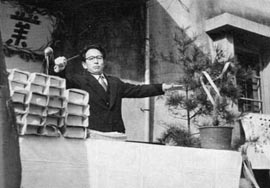
| |
| |
| | |
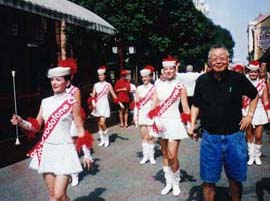
| |
| |
| | |
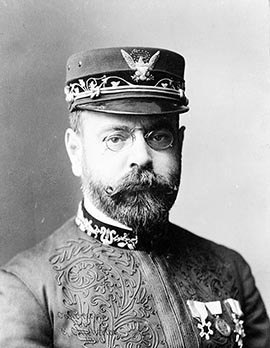
| |
| John Philip Sousa (1854-1932) |
- When did I become interested in classical music? It was 1948, during
the final year of my elementary school period, there was an art festival.
There my female classmates performed a dance to a wonderful music. I
did not know its title until later years. It was the "Over the Waves"
by Juventano Rosas (Mexican composer).
This is still my favorite music. While I was dining at Vienna's Augustinerkeller restaurant in December (2000), I asked this accordionist to play the Over the Waves. I was there again in 2006 and asked him to play the same music.
Let us hear the Over the Waves.
-
Over the waves, played by a Mexican orchestra.
-
by another Mexican orchestra.
- Over the Waves, played by the Red Army Band.
- Over the Wave by the UNAM (National Univ. of Mexico) Orchestra. The "Over the Waves" was composed by a Mexican composer Juventino Rosas.
- Accordion Music.
- Over the waves with male voice.
- Over the Waves, played by the Red Army Band.
-
Over the waves, played by a Mexican orchestra.
- In 1950 and 1951, I started liking other classical waltzes. I picked
up many waltzes from Japanese radio programs. I learned that Johann
Strauss wrote many waltzes. In addition, I liked
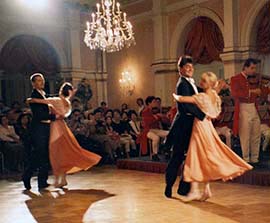

-
Waves of the Danube by Josif Ivanovici (Romanian).
-
Gold and Silver Waltz by Franz Lehar.
- Skater's Waltz and
-
Estudiantina by Emile Waldteufel.
-
Invitation to Dance by Carl Maria von Weber. In the spring of 1951,
I made a radio set with four vacuum tubes. This music is was the first
signal I picked up from Japanese broadcasting with my radio. I was
in the southern coast of Korea to avoid the Korean war battles.
- Tchaikovsky Waltzes
- Sleeping Beauty
- Dance of Snow Flakes
- Waltz of Flowers from Tchaikovsky's Nutcrackers.
-
Coppelia Waltz by Léo Delibes
- Faust Waltz by Charles Gounod. This used to be a favorite song by my high school chorus.
- Ballet music
from Faust.
-
Chopin's piano music for relaxation.
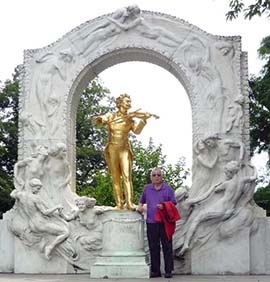
-
Johann Strauss II. How can we leave out him and his Blue Danube?
- Voices of Spring I used to hear this from Japanese radio as Haru-no Koei.
- Tales from Vienna Woods. Its title in Japanese is Vienna Mori-no Monokatari.
-
An Artist's Life. A very popular item at Korean Tea Rooms.
- Emperor Waltz.
- Roses from the South.
- Vienna Blood. I do not have recollection of hearing this waltz in Korea, but it must have been popular there.
- Die Fledermaus. Korea's KBS used to send out this waltz often. The Korean title is "Bak-Jui."
- More Strauss waltzes.
-
Waves of the Danube by Josif Ivanovici (Romanian).
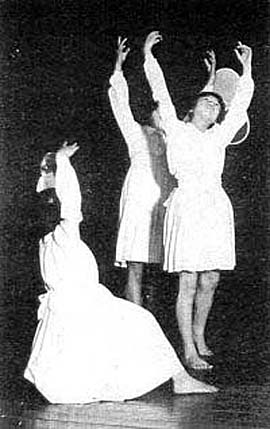
|
